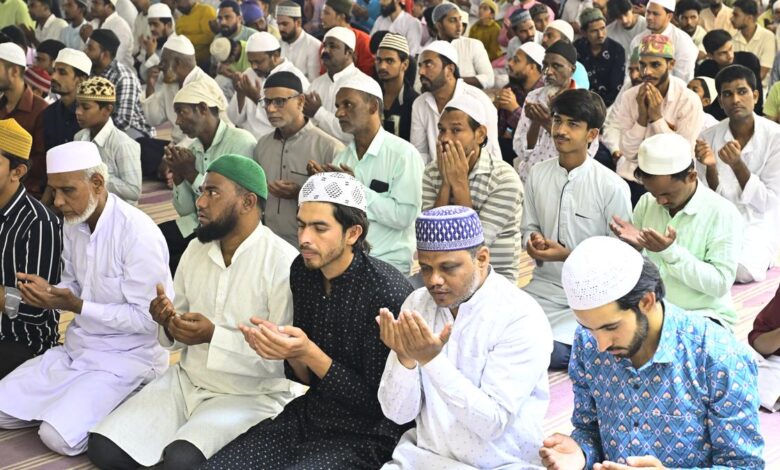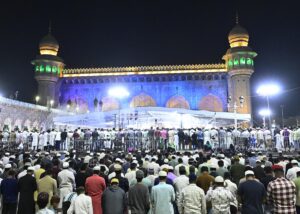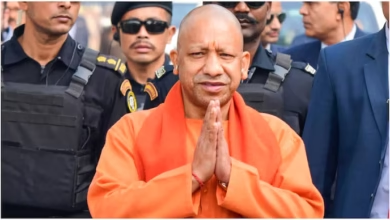Mecca Masjid: A Sanctuary of Social, Political, Religious, and Anti-Colonial Significance
The masjid, which once served as a key platform in the fight for the country’s freedom from British colonial rule, continues to be an important space for asserting the political agency of Hyderabad’s Muslim community.

Mecca Masjid: A Legacy of Political Agency and Religious Significance
Mecca Masjid, the oldest and most prominent mosque in India, has been much more than just a place of worship over the centuries. In the heart of Hyderabad, the historic mosque has not only remained a focal point of religious activities but also for the socio-political life of the region. Its cultural significance goes beyond its architectural beauty, standing as a powerful symbol of resistance to British colonialism and, more recently, an important political platform for Hyderabad’s Muslim community.

A Refuge for Anti-Colonial Struggle
The roots of Mecca Masjid’s political significance are found in the era of British colonial rule. During an age of oppression and rebellion, the masjid was a critical platform for the freedom movement. The fact that the mosque was centrally located in Hyderabad made it the most natural point where one would assemble individuals keen on defying British domination. During the freedom struggle of India, individuals across various professions sought refuge and fortitude within the walls of the masjid in terms of leadership and activism. The congregation in the mosque comprised not only religious faithful but also revolutionaries and thinkers who dissented against colonialism. It was used as a site for planning demonstrations, mobilizing masses for different movements, and debating tactics for the freedom of India. The importance of Mecca Masjid was inescapably connected to the wider socio-political texture of Hyderabad, which, while princely, was impacted by the wider national movements cutting across the nation.
A Space for Political Expression
Post-independence India witnessed Mecca Masjid remaining a centre of socio-political discourse. Even though the mosque has never been a centre of religious practice and spiritual introspection alone, it is equally significant as a site of asserting the political voice of Hyderabad’s Muslim population.
For decades, the Hyderabad Muslims as an important minority community in the city have used the Mecca Masjid as a stage to express themselves against problems of various kinds.
Millions of demonstrations, protests, and public rallies on issues varying from local administration to national policies in regard to the Muslim community have been witnessed in the mosque. These events are generally taken as an indication of the resilience of the community and their ongoing effort to make their political presence felt in a changing India. Whether it is issues of social justice, inequality, or demands for greater representation, the mosque is a space where the Muslim community is able to gather, mobilize for their rights, and ensure that their voices are heard in public. The political significance of Mecca Masjid is gigantic, and each gathering is a reaffirmation of the community to participate actively in the democratic process.
A Symbol of Identity and Unity
Besides its political prominence, Mecca Masjid has acted as a symbol of Muslim society in Hyderabad.
The history of the mosque is not a relic of the past but a symbol of collective identity. Being a principal mosque in India, it is placed in an optimum position within Hyderabad’s cultural and religious heritage. The ceremonies and customs performed there link individuals to a collective past, a sense of identity. In addition, the mosque has often become the center of Hyderabad’s overall cultural identity, extending into the city’s abundant heritage. Its beauty and historical significance illustrate the highly entrenched connections between religion, culture, and politics in the region. In times of political unrest, as well as social challenges, Mecca Masjid is a place where Muslims can find the strength of numbers, remaining resilient and united in spite of adversity.
Challenges and Controversies
While the mosque is a symbol of strength for Hyderabad’s Muslims, it has also been at the center of controversies. There have been several instances in the past when the position of the mosque in the socio-political context has been questioned. The mosque has been criticized, especially when its political activism has been linked to wider debates on religious identity, minority rights, and state policies.
Despite these challenges, the significance of Mecca Masjid cannot be overlooked. It is a unique institution in Hyderabad’s religious and political life, a sanctuary for religion and activism alike. The mosque’s dual role as a religious institution and a political activism site is the crux of India’s modern history—where religion, politics, and social change are likely to meet.
Conclusion
Mecca Masjid is more than a place of worship; it is a sanctuary where religion and politics meet with history.
Its role in the struggle for freedom in India, as well as its continued use as a political platform and unifying site of religious identity, cements its place as one of the foundation stones of Hyderabad’s identity. As it keeps on serving the people, Mecca Masjid keeps on being a powerful reminder of the unbroken connection between religion, politics, and the quest for justice. As either a symbol of resistance against colonialism or as a political activism platform, the legacy of Mecca Masjid will continue to influence future generations.






